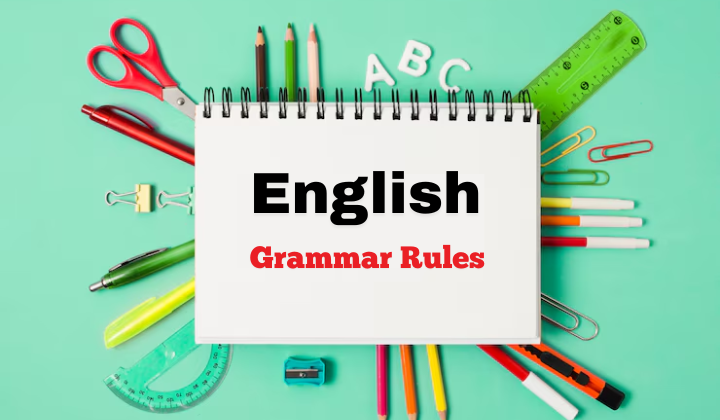As you all know, the PNB SO Exam 2025 is scheduled for 5 May 2025, leaving very little time for perfect preparation. This is the crucial phase to refine your understanding of each subject. Among all the subjects, English holds significant importance in the PNB SO Exam. A strong command of English helps in clearing the written examination and boosts overall communication skills, which are vital for a Specialist Officer’s role.
English Grammar Rules for PNB SO
To assist you in this last-minute preparation for PNB SO, we present a concise compilation of essential English Grammar Rules that will help you strengthen your fundamentals and enhance your accuracy and speed in the exam.
- Nouns – Rules
- Rule 1: Proper nouns always begin with a capital letter.
correct: Ravi lives in Delhi. - Rule 2: Uncountable nouns do not take ‘a’ or ‘an’ and are always singular.
correct: Information is useful.
Incorrect: An information is useful. - Rule 3: Collective nouns may take singular or plural verbs depending on usage.
correct: The team is winning. (as a unit)
correct: The team are arguing. (as individuals)
- Pronouns – Rules
- Rule 1: Pronouns must agree with their antecedents in number and gender.
correct: Each student did his homework. - Rule 2: Avoid ambiguous pronouns.
Incorrect: When Rahul met Mohan, he was happy. (Who is “he”?) - Rule 3: Reflexive pronouns cannot be the subject.
Incorrect: Myself went to the market.
correct: I went to the market myself.
- Verbs – Rules
- Rule 1: Verbs must agree with subjects in number.
correct: He runs fast.
Incorrect: He run fast. - Rule 2: Use the correct form of verb after modals.
correct: She can speak English. - Rule 3: Avoid double negatives.
Incorrect: He did not do nothing.
correct: He did not do anything.
- Tense – Rules
- Rule 1: Keep tense consistent in a sentence.
correct: She came, sat down, and started to talk. - Rule 2: Present perfect is used for actions that happened at an unspecified time.
correct: I have seen that movie. - Rule 3: Use past perfect for the earlier of two past actions.
correct: He had left before I arrived.
- Adjectives – Rules
- Rule 1: Adjectives usually come before nouns.
correct: She wore a red dress. - Rule 2: Do not use comparative with “double comparatives”.
Incorrect: More better
correct: Better - Rule 3: Use correct adjective order.
correct: A beautiful small round Indian table.
- Adverbs – Rules
- Rule 1: Adverbs modify verbs, adjectives, or other adverbs.
correct: She sings beautifully. - Rule 2: Never use “not” with “hardly”, “scarcely”, “barely”.
Incorrect: I did not hardly see him.
correct: I hardly saw him. - Rule 3: Adverbs of frequency come before main verbs, but after “to be”.
correct: She always comes late.
correct: She is always late.
- Subject-Verb Agreement – Rules
- Rule 1: Singular subjects take singular verbs.
correct: The dog barks. - Rule 2: When using “either/or”, the verb agrees with the nearest subject.
correct: Either the boys or the girl is responsible. - Rule 3: Indefinite pronouns like everyone, each, anybody are singular.
correct: Everyone is here.
- Prepositions – Rules
- Rule 1: Use “in” for months/years, “on” for dates/days, “at” for time.
correct: Born in 1999, on Monday, at 5 PM. - Rule 2: Some verbs are always followed by specific prepositions.
- interested in, rely on, good at, etc.
correct: She is good at math.
- interested in, rely on, good at, etc.
- Rule 3: Avoid redundant prepositions.
Incorrect: Where are you going to?
correct: Where are you going?
- Conjunctions – Rules
- Rule 1: Correlative conjunctions must be paired properly.
correct: Not only… but also, Either… or, Neither… nor - Rule 2: Use “although” (contrast) – not followed by “but”.
correct: Although he is poor, he is honest. - Rule 3: Avoid comma splices (joining 2 sentences with just a comma).
Incorrect: She was tired, she slept.
correct: She was tired, so she slept.
- Articles – Rules
- Rule 1: Use “a” before consonant sounds, “an” before vowel sounds.
correct: a book, an apple, an hour - Rule 2: Use “the” before specific or previously mentioned nouns.
correct: I saw a dog. The dog was barking. - Rule 3: Do not use articles before proper nouns.
Incorrect: The India is a big country.
- Voice (Active/Passive) – Rules
- Rule 1: In passive voice, object becomes subject.
correct: He wrote a letter. → A letter was written by him. - Rule 2: Only transitive verbs can be used in passive voice.
- Rule 3: Tense must be preserved in voice change.
- Direct & Indirect Speech – Rules
- Rule 1: Change in tense (if reporting verb is past).
correct: He said, “I am tired.” → He said that he was tired. - Rule 2: Change pronouns and time expressions.
- now → then, today → that day, I → he/she
- Rule 3: No tense change if reporting verb is in present.
correct: He says, “I am happy.” → He says that he is happy.
- Conditional Sentences – Rules
| If-Clause (Condition) | Main Clause (Result) | Example |
| Simple Present | Simple Present | If you heat ice, it melts. |
| Simple Present | Will + Verb | If it rains, I will stay. |
| Simple Past | Would + Verb | If I were you, I would go. |
| Past Perfect | Would have + Past Participle | If he had studied, he would have passed. |
| Related Posts |
||
| PNB SO Salary | PNB SO Syllabus | |
| PNB SO Cut Off | PNB SO Previous Year Paper | |




 IBPS Recruitment 2026 Notification Out F...
IBPS Recruitment 2026 Notification Out F...
 Daily Current Affairs Quiz 25th February...
Daily Current Affairs Quiz 25th February...
 Bank PO at 21: Chinu Kavia’s Unbelievabl...
Bank PO at 21: Chinu Kavia’s Unbelievabl...








